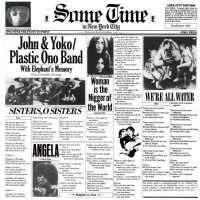
Recorded: 13 February – 8 March 1972
Producers: John Lennon, Yoko Ono, Phil Spector
Released: 15 September 1972 (UK), 12 June 1972 (US)
Available on:
Some Time In New York City
Personnel
John Lennon: vocals, guitar
Yoko Ono: vocals
Adam Ippolito: piano, organ
Gary Van Scyoc: bass guitar
Stan Bronstein: saxophone
Richard Frank Jr: drums, percussion
Jim Keltner: drums
‘Angela’ was written in support of Angela Davis, a Black Panther supporter who was tried and eventually acquitted for suspected involvement in the murder of Judge Harold Haley in California.
The song began life as ‘JJ’, a third-person song about a woman who “couldn’t get laid at all”.
John Lennon recorded a demo of ‘JJ’ at the St Regis Hotel in September 1971. The hotel was his and Ono’s first base upon their arrival in New York. Although the tune was in place at this time, the lyrics were eventually scrapped and replaced.
Lennon evidently liked the melody for ‘JJ’, but had trouble decided what to do with it. Towards the end of 1971 he recorded a number of home demos, one of which featured the song renamed ‘People’. The lyrics had lost their early sexist connotations and now featured somewhat bland requests for peace and understanding.
By the time studio work began on Some Time In New York City in February 1972, ‘People’ had been rewritten as ‘Angela’.
Angela Davis was arrested as a suspected accomplice in the kidnap and murder of Superior Court Judge Harold Haley on 7 August 1970. Firearms used in the incident had been purchased in her name two days before; a warrant for her arrest was issued, and on 18 August she became the third woman to appear on the FBI’s Ten Most Wanted list.
The murder occurred when a courtroom at the Marin County Civic Center was held up by 17-year-old Jonathan Jackson, who freed three San Quentin prisoners. Haley and four others were taken hostage, and he was killed by a sawn-off shotgun.
Davis fled California and spent more than two months on the run before being captured in New York City. At her trial in 1972 the jury returned a not guilty verdict, deciding that her ownership of the guns did not establish culpability for the plot.
During her incarceration Lennon and Ono wrote the words for ‘Angela’ to show their support. Mick Jagger, too, was sympathetic, and wrote ‘Sweet Black Angel’ for her; the song appeared on The Rolling Stones’ 1972 album Exile On Main Street. Jagger’s lyrics, while no masterpiece, proved the superior of the two.
Some Time In New York City was largely written as a reaction to the personal and political situations as seen by Lennon and Yoko Ono upon their move to the United States. Some songs were generic expressions of protest, while others were targeted at specific incidents or people.
‘Angela’ is perhaps the album’s least successful example from the latter category. The lyrics feel insipid and uninspired, with Lennon’s gift for precision and directness mostly absent. One wonders how much thought was given to a chorus which contains perhaps the weakest lines on the entire album:
They gave you sunshine
They gave you sea
They gave you everything but the jailhouse key.
They gave you coffee
They gave you tea
They gave you everything but equality.
One of the lines – “There’s a wind that never dies” – was taken from ‘To The Wesleyan People’, a footnote to a lecture given by Yoko Ono on 13 January 1966. With her vocals mixed to the fore, and Ono-style aphorisms appearing in various lines, it appears that she was the main composer of the lyrics.


Spot on. A promising melody at the outset but, owing to the lyrics and Yoko’s vocal, it ends up being very disappointing.
No need to be rude, though I tend to agree, maybe I could remove the vocals , keeping just the backing, & fly john in from some of the various demos, belatedly turning into a nice JL track,,.where are the demos & how many are there ? I know of two, People & JJ. Biggest problem JL is playing acoustic while singing & its probably louder than the vocal…still it’s possible, maybe,,,where are the highest fidelity demos of it ?
Naive and garbage.
It’s the reviews I read here that are garbage. While the track itself is excellent and poignant, even with Yoko’s vocals.